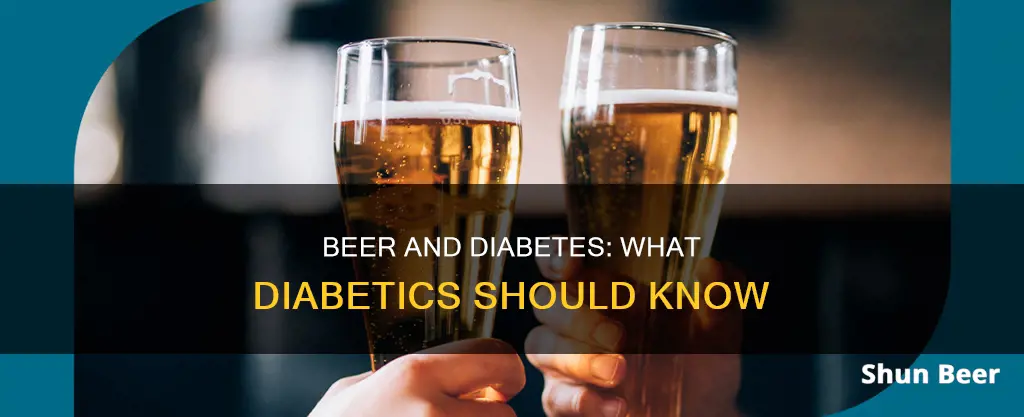
People with diabetes do not need to abstain from alcohol entirely, but there are some important considerations to keep in mind. Alcohol can interfere with the liver's ability to regulate blood sugar levels, which can lead to hypoglycaemia, especially if drinking on an empty stomach. Alcohol can also affect weight management, as it is often high in calories, and can interfere with diabetes medication. However, moderate drinking (no more than one drink per day for women and up to two drinks per day for men) is generally considered safe for people with diabetes.
| Characteristics | Values |
|---|---|
| Alcohol consumption recommendations | No more than one drink a day for women and up to two drinks a day for men. |
| Binge drinking | Drinking more than four drinks (for women) or five drinks (for men) within two hours is strongly discouraged. |
| One serving of beer | 12 ounces |
| Light beers | Lowest in carbs, calories, and alcohol |
| Hoppy craft beers | Higher in carbs, calories, and alcohol |
| Alcohol's effect on the liver | Alcohol competes with the liver's ability to produce glucose when blood sugar is low. |
| Hypoglycemia | Alcohol can cause hypoglycemia for up to 24 hours in people on insulin or other anti-hyperglycemic medications. |
| Alcohol's effect on judgment | Alcohol can cloud your judgment, so you may not realize that your blood sugar is low. |
| Alcohol and diabetes medications | Alcohol may reduce the effectiveness of diabetes medications. |
| Alcohol and weight gain | Alcoholic drinks often have a lot of calories, which can lead to weight gain. |
| Alcohol and neuropathy | Excessive alcohol can worsen peripheral neuropathy (nerve damage). |
| Alcohol and sleep | Alcohol can cause insomnia or decreased quality of sleep. |
| Alcohol and cancer | Excessive alcohol consumption can increase the risk of certain types of cancer. |
| Alcohol and heart disease | Excessive alcohol consumption can increase the risk of heart disease. |
What You'll Learn

Beer and weight gain
Calories in Beer
Beer contains a significant number of calories, with a standard 12-ounce (355-millilitre) serving of regular beer containing approximately 153 calories. Light beers have fewer calories, usually five or less grams per serving, and are also lower in alcohol content. The calorie content of beer depends on its strength—the higher the alcohol content, the more calories it contains. This is because alcohol has about seven calories per gram, higher than carbs and protein, which have four calories per gram.
How Beer May Contribute to Weight Gain
Beer may contribute to weight gain in several ways:
- Increased Calorie Intake: Beer contains as many calories as a soft drink, and drinking alcohol can also increase your appetite, leading to excess calorie consumption.
- Inhibited Fat Burning: Alcohol prevents your body from burning fat. When you drink alcohol, your body prioritizes breaking it down over other sources of fuel, including stored fat.
- Phytoestrogen Content: Beer is flavoured using hops, which are high in phytoestrogens—plant compounds that can mimic the female sex hormone estrogen. It is suggested that these phytoestrogens may cause hormonal changes in men that increase the risk of storing belly fat. However, the exact effects of these plant compounds on weight or belly fat are unknown.
Tips to Avoid Weight Gain
To minimize the risk of weight gain while drinking beer, consider the following:
- Avoid Binge Drinking: Binge drinking can lead to weight gain and a "beer belly". It is recommended to limit alcohol consumption to no more than one to two drinks per day, depending on gender.
- Avoid Binge Eating: Drinking can often lead to mindless eating, especially when distracted by conversation or other activities. Try to avoid fatty and calorie-rich snacks and opt for vegetables and protein-rich foods instead.
- Rotate with Non-Alcoholic or Alcohol-Free Beer: These options contain minimal to no alcohol and fewer calories, helping to reduce your overall calorie intake.
- Pick Your Calories Wisely: If you prefer the taste of heavier beers, consider drinking only one and savouring it instead of drinking multiple lighter beers.
- Exercise and Diet: Regular exercise and a healthy diet are crucial to maintaining a healthy weight. Cardio and high-intensity exercises are particularly effective for losing belly fat.
White Tongue and Beer: Is It Safe to Drink?
You may want to see also

Alcohol and hypoglycaemia
People with diabetes are particularly susceptible to hypoglycaemia when drinking alcohol as their bodies already struggle to balance blood sugar levels. Additionally, alcohol can interfere with the medications used to treat diabetes, such as insulin and sulphonylureas, further increasing the risk of hypoglycaemia.
Drinking on an empty stomach further increases the likelihood of hypoglycaemia. This is because the liver needs carbohydrates from food to effectively stabilise blood sugar levels. Therefore, it is important to eat before drinking alcohol to reduce the risk of hypoglycaemia.
Symptoms of hypoglycaemia include lightheadedness and dizziness, which can be difficult to distinguish from the signs of intoxication. If left untreated, hypoglycaemia can lead to severe health problems, including loss of consciousness and coma. Therefore, it is crucial to monitor blood sugar levels when consuming alcohol, especially for people with diabetes.
Beer and Prilosec: Safe Mix or Health Risk?
You may want to see also

Diabetes medication and alcohol
People with diabetes can still drink alcohol, but they need to be aware of how it can affect their body and how to manage this. Alcohol can interfere with blood sugar levels and affect weight due to the number of calories in alcoholic drinks. Excess alcohol intake is associated with an increased risk of type 2 diabetes.
Alcohol can interact with diabetes medications and impact blood sugar. It is important to talk to your doctor about how alcohol may impact your condition management plan, even if you only have an occasional drink. Alcohol can cause blood glucose levels to rise or fall, depending on how much you drink. Some diabetes pills (including sulphonylureas and meglitinides) also lower blood glucose levels by stimulating the pancreas to make more insulin. Combining the blood-sugar-lowering effects of the medication with alcohol can lead to hypoglycaemia or "insulin shock", which is a medical emergency.
If you take metformin to treat your type 2 diabetes, drinking alcohol can affect your diabetes directly, but you may face additional risks if you drink alcohol with metformin. Metformin and alcohol can interact with harmful effects, although this is rare. Binge drinking or chronic heavy drinking while taking metformin can cause extremely low blood sugar levels.
If you are taking insulin or other diabetes medications, drinking alcohol can add to the risk of having a hypo, because alcohol reduces your body's ability to recover when blood sugar levels are dropping. Usually, the liver stores extra glucose, which is released back into the blood when needed, such as when blood sugar levels drop. But alcohol interferes with the liver's ability to do this effectively.
Precautions
- Don't drink alcohol on an empty stomach.
- Don't drink alcohol when your blood sugar is low.
- Eat food before or after drinking alcohol.
- Stay hydrated by drinking plenty of water while drinking alcohol.
- Check your blood sugar levels before you drink, while you drink, before you go to bed, and for up to 24 hours after you drink alcohol.
- If you take insulin, you might need to change your dose depending on your blood sugar levels. Talk to your healthcare team about what you should be doing.
Beer and Lemon: A Refreshing Mix?
You may want to see also

Safe drinking guidelines for diabetics
If you have diabetes, drinking alcohol can impact your blood sugar levels, increase your appetite, and reduce your medication's effectiveness. Alcohol can also affect your body's ability to regulate blood sugar, making it drop, especially if you haven't eaten enough.
Understand the risks
It is important to understand how alcohol can affect your diabetes and what steps you need to take to prevent problems. Alcohol can cause your blood sugar to drop very low, known as hypoglycemia, or even raise it too high (hyperglycemia). It can also interfere with the effects of diabetes medications, depending on the type you take. Additionally, alcoholic drinks such as beer and sweetened mixed drinks are high in carbohydrates, which can also raise blood sugar levels.
Drink in moderation
Moderate alcohol consumption (no more than one to two drinks per day) is considered safe for most people with diabetes. Specifically, it is recommended that women have no more than one drink per day, and men should limit themselves to no more than two drinks per day. It is also important to avoid "binge drinking" or drinking more than four drinks (for women) or five drinks (for men) within two hours.
Drink with food
To prevent hypoglycemia, avoid drinking on an empty stomach. Make sure you have food, especially carbohydrates, when drinking alcohol. Eating slows down the absorption of alcohol and helps maintain normal blood sugar levels.
Monitor your blood sugar levels
Check your blood sugar levels before, during, and after drinking. This will help you manage your diabetes and ensure that your blood sugar levels remain stable.
Avoid drinking if your blood sugar is low
If your blood sugar levels are already low, it is best to avoid drinking alcohol. Alcohol can further lower your blood sugar and put you at risk of hypoglycemia.
Be mindful of calorie intake
Alcoholic drinks often contain a lot of calories, which can make it difficult to lose weight or manage your diabetes. Calories from alcohol are stored in the liver as fat, making it more challenging to control your blood sugar.
Choose low-carb drinks
When selecting an alcoholic beverage, opt for drinks with fewer carbohydrates, such as light beers, dry wines, and seltzers. Avoid drinks with sweet mixers or juices, as they can raise your blood sugar levels.
Consult your doctor
Talk to your doctor about your drinking habits and diabetes management. They can provide personalized advice and guidelines based on your specific health concerns and medication regimen.
Teeth Whitening and Beer: What You Need to Know
You may want to see also

Alcohol-free alternatives
Alcohol-free beer is an option for diabetics, but it's important to be aware that these drinks can still contain calories and carbohydrates. For example, non-alcoholic Heineken has 1100% more sugar than the original, and San Miguel 0% has 70% more carbohydrates.
When considering alcohol-free alternatives, it's best to opt for drinks that are not only alcohol-free but also low in sugar and carbohydrates. For instance, spirits such as vodka and rum with a diet mixer like lemonade, ginger ale, cola, or water are recommended. You can also try diet soft drinks, such as diet pink lemonade, diet cherry cola, or diet cranberry lemonade.
If you're looking for a beer alternative, there are a few options with lower sugar and carbohydrates. One example is the Lean Brew IPA, which has 35% fewer calories, 80% less carbohydrates, and still 90% of the alcohol of the market-leading alternative.
It's important to remember that even with these alternatives, drinking in moderation is crucial, especially if you have diabetes. Additionally, always consult with your healthcare provider to determine what is suitable for your specific needs and conditions.
Kayaking and Beer: A Safe Combo?
You may want to see also
Frequently asked questions
People with diabetes do not need to cut alcohol out of their diet, but they should be aware of how it can affect their body and how to manage this. Alcohol competes with the liver's ability to produce glucose when blood sugar is low, which can lead to hypoglycaemia. It is recommended that diabetics drink in moderation and only when their diabetes and blood sugar levels are well managed.
Alcohol consumption recommendations are generally the same for people with diabetes as for the rest of the population: no more than one drink a day for women and up to two drinks a day for men. Binge drinking is strongly discouraged for health and safety reasons.
Excessive alcohol consumption can cause numerous health risks for diabetics, including worsening peripheral neuropathy (nerve damage), insomnia or decreased quality of sleep, and an increased risk of certain types of cancer and heart disease. Alcohol can also affect a diabetic's weight, as alcoholic drinks can be high in calories.
There is no 'best' alcoholic drink for people with diabetes. However, it is recommended to avoid low-sugar beers and ciders, as well as low-alcohol wines, as these often have more sugar than normal ones. Diabetics should also have diet or sugar-free mixers with spirits.
Diabetics should drink beer in moderation and only with food, preferably a meal or snack that includes carbohydrates. They should also monitor their blood sugar levels before, during, and after drinking, and be sure to have a source of sugar, such as glucose tablets, with them in case of low blood sugar.







